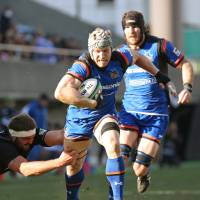Australian rugby star David Pocock has enjoyed locking horns with the big beasts of Japan's Top League since joining the Panasonic Wild Knights in December.
But the free-spirited 28-year-old is ready for an even bigger adventure as he prepares to take a six-month sabbatical from rugby from February to do conservation work in southern Africa.
"I'm going back to Perth to get a little bit of surgery on my hand, then going to southern Africa," Pocock told The Japan Times ahead of Panasonic's 15-14 win over the Toshiba Brave Lupus on Saturday.
"We'll probably base ourselves in Zimbabwe. I'm involved in a couple of things there around conservation, farming and community development, so I'll do some work on that and do some work on the farm."
Pocock is no average rugby player by any definition of the word. The back-row forward is widely recognized as one of the world's best players, has won 66 caps for Australia, and was one of the stars of the 2015 World Cup as the Wallabies finished runners-up to New Zealand.
But Pocock is known just as much for his activities off the field as on it. In 2014 he was arrested for chaining himself to a digger in protest at a new coal mine, and he has spoken out on a range of issues including gay rights, feminism and the environment. He and his partner, Emma, refuse to get married until same-sex marriage is made legal across Australia.
Now Pocock has come to a new phase in his career, signing a three-year deal with Panasonic that also keeps him within the Australian rugby set-up and allows him some time off before preparing for the 2019 World Cup in Japan.
"In some ways it's actually pretty scary taking some time off, to be honest," he said. "This is what I've been doing since I was 17 and it's what I know. Taking time off and then backing myself to get back into shape and back into playing good rugby is a bit daunting but something that I'm keen to do.
"My goal is to be playing good rugby and be selected for the World Cup. You want to be playing your part and be playing as good rugby as you can. We'll have to see what happens. Three years is a long time in rugby so it's very hard to predict things that far out."
On Pocock's immediate radar is a trip to southern Africa, where he will work with conservation organization Wild Ark to raise awareness for the protection of wildlife. Pocock was born in Zimbabwe but moved to Australia at the age of 12 when his family was forced to abandon its farm by President Robert Mugabe's land seizures.
"I've still got family there, and generally people are incredibly friendly," he said. "Times are tough. Economically, things are really tough and there is a massive shortage of cash. I only get a couple of weeks a year there during leave, so having a few months this time is going to be a lot different and hopefully very enjoyable."
Pocock will return to Panasonic in August in time for the start of the 2017-18 Top League season, and his brief taste of Japan so far has left him hungry for more.
"I've loved it," he said. "I arrived and played two days later, so I just kind of got into it. It's enjoyable rugby — it's fast and teams generally look to use the ball a lot. I think I'm pretty lucky to be at a team like Panasonic. We've got some great players across the park and I've really enjoyed getting to know them and playing alongside them."
But while Pocock is ready to learn and grow as a player and person, he is not prepared to compromise his beliefs. Critics have urged him to tone down his activism and concentrate on rugby, but Pocock believes he has a responsibility to speak his mind.
"In terms of social responsibility or whatever you want to call it, I personally feel like I've benefited so much from being able to get paid to chase a rugby ball around a field," he said. "It was a dream as a kid, and to be able to do that and get paid for it, I feel like I want to use whatever small platform I have to hopefully get kids who were like me — obsessed by rugby — thinking about things that are probably far more important than rugby.
"There are some huge issues that we are facing, and if I can get people thinking and talking about them then I think that's a good thing."



